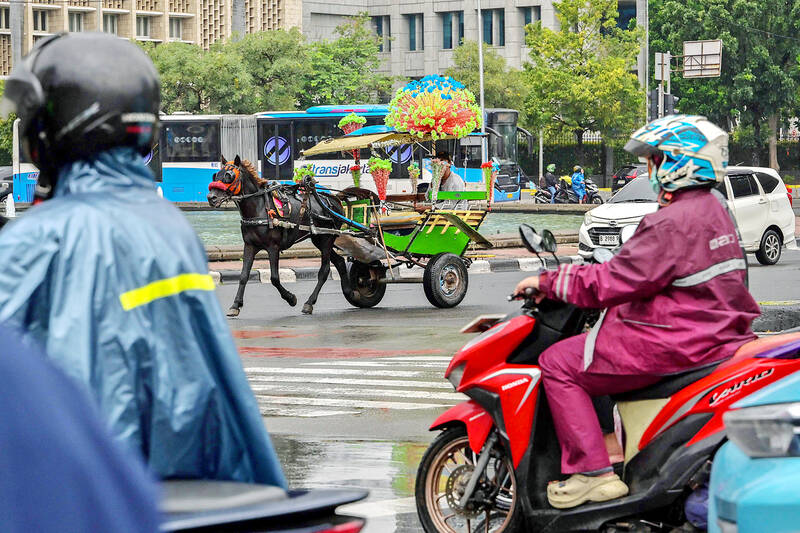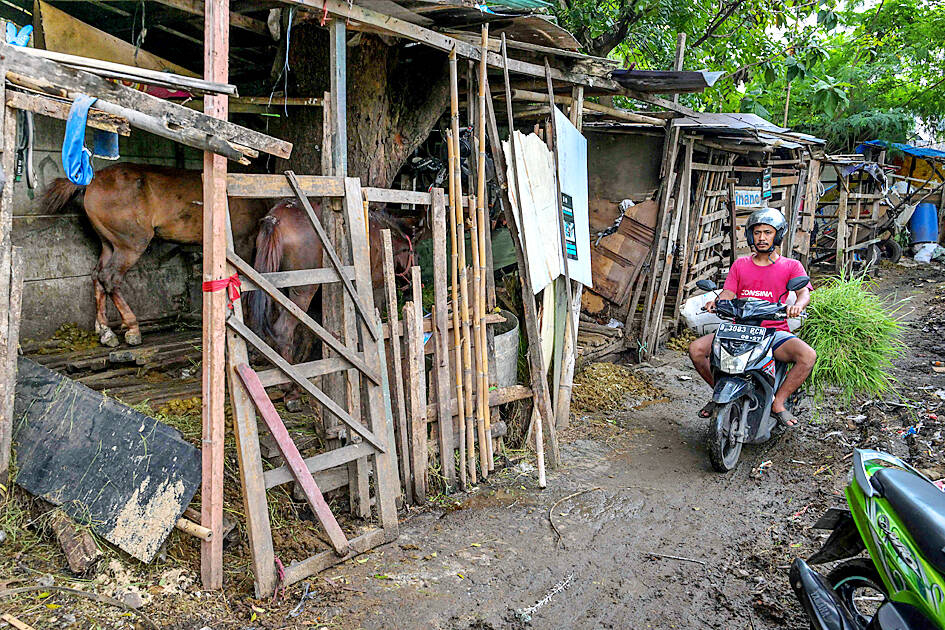In a dark stable under a heaving highway in Indonesia’s capital, trucks rumbled past emaciated carriage horses tied to pillars in ramshackle wooden stalls, their ribs protruding.
The steeds are used to pull traditional wooden carriages known as delman, once a staple of colonial-era transportation, but fading from view in Jakarta in an era dominated by ride-hailing apps.
Now limited to just a few areas of the city, only several hundred delman horses remain to ferry tourists on weekends or public holidays. Animal rights advocates say the conditions under which the horses are kept are so harsh the practice must end.

Photo: AFP
“Thank God, in here, at least the horses are protected from the sun’s heat and rain,” 52-year-old carriage driver Sutomo said under the highway.
On central Jakarta’s bustling streets, the horse-drawn carriage bells can be heard clinking in rhythm with clopping hooves that compete with the blare of car engines and horns.
However, Sutomo said that a 4.5km jaunt around Indonesia’s National Monument can fetch just 50,000 rupiah (US$3.06) — a trip he only makes two or three times a day.

Photo: AFP
“When income is low, my son, who works at a company, shares some of his salary,” he said. “Thank God at least that can cover food for my family, but for the horse, we have to reduce its food,” he said.
Rights groups said such limited income has forced owners and some who rent the horses to ignore proper horse care, leading to malnutrition and poor living conditions.
There are about 200 carthorses still in service at about 20 stables, according to estimates, including one squalid encampment holding 15 horses. It was surrounded by garbage and plastic debris next to a smelly, polluted river.
“The conditions are really, really bad,” said Karin Franken, cofounder of Jakarta Animal Aid Network (JAAN), a non-governmental organization that has been advocating for delman horses since 2014.
“They are not treating the horses very well [but] very aggressively, very rough,” she said.
To a tourist’s eye, the delman can appear as a colorful addition to the city, adorned by decorations and small bells that jingle when the horse moves.
However, some owners still rely on harmful traditional medications, including puncturing the horse’s muscles with bamboo sticks to pass a rope through to “cleanse” its blood.
During the COVID-19 pandemic, some horses died of starvation, Franken said, calling for the delman to be gradually phased out.
“The life as a delman horse, especially in Jakarta, is really terrible,” she said.
While there is a national animal protection law, there is little monitoring of contraventions, JAAN said.
The local government said it remained committed to animal welfare, but needed more help.
“We need support from other parties ... to be able to provide services such as free medical checkups,” Jakarta Food Security, Maritime and Agriculture Agency head Suharini Eliawati said. “The owners must obey the rules in animal welfare protection.”
Franken said JAAN tries to educate delman workers on how to provide better treatment for the horses, in exchange for free medical care for the animals, but many people do not comply on grounds of tradition or financial issues.
“They can barely take care of themselves and their families, let alone horses. It’s very sad for both,” Franken said. “There still are, unfortunately, cases of extreme abuse or neglect.”
Young delman drivers are open to moving to other jobs such as ride-hailing motor-taxi driver, but older ones are more stubborn “because they say it’s the only thing they can do,” she said.
Some are likely to keep trying to make a penny, despite pushing their equine breadwinners to the brink.
“I like animals. I also like this job,” delman owner Novan Yuge Prihatmoko said, as he guided his horse through West Jakarta, adding that he can earn 150,000 rupiah a day. “I feel comfortable, so why not? I just keep doing this for a living.”

THE TRAGEDY OF PUNCH: Footage of the seven-month-old Japanese macaque has gone viral online after he was rejected by his mother and formed a bond with a soft toy A baby monkey in Japan has captured hearts around the world after videos of him being bullied by other monkeys and rejected by his mother went viral last week. Punch, a Japanese macaque, was born in July last year at Ichikawa City Zoo. He has drawn international attention after zookeepers gave him a stuffed orangutan toy after he was abandoned by his mother. Without maternal guidance to help him integrate, Punch has turned to the toy for comfort. He has been filmed multiple times being dragged and chased by older Japanese macaques inside the enclosure. Early clips showed him wandering alone with

South Korea would soon no longer be one of the few countries where Google Maps does not work properly, after its security-conscious government reversed a two-decade stance to approve the export of high-precision map data to overseas servers. The approval was made “on the condition that strict security requirements are met,” the South Korean Ministry of Land, Infrastructure and Transport said. Those conditions include blurring military and other sensitive security-related facilities, as well as restricting longitude and latitude coordinates for South Korean territory on products such as Google Maps and Google Earth, it said. The decision is expected to hurt Naver and Kakao

Australian Prime Minister Anthony Albanese yesterday said he did not take his security for granted, after he was evacuated from his residence for several hours following a bomb threat sent to a Chinese dance group. Albanese was evacuated from his Canberra residence late on Tuesday following the threat, and returned a few hours later after nothing suspicious was found. The bomb scare was among several e-mails threatening Albanese sent to a representative of Shen Yun, a classical Chinese dance troupe banned in China that is due to perform in Australia this month, a spokesperson for the group said in a statement. The e-mail

TENSIONS: The march went ahead without clashes, but arrests were still possible as police investigate suspects behind Nazi salutes, racist slurs and homophobic insults Thousands of people on Saturday marched in southeastern France under heavy security in tribute to a far-right activist whose killing, blamed on the hard left, has put the country on edge. The crowd — many wearing black and some covering their lower faces with masks — marched through the city of Lyon carrying flowers and placards bearing pictures of Quentin Deranque and the words: “justice for Quentin” and “the extreme left kills.” The 23-year-old died from head injuries following clashes between radical left and far-right supporters on the sidelines of a demonstration against a politician from the left-wing France Unbowed